These guidelines have been designed to help those involved in the assessment of emergency water sources to collect relevant information in a systematic way, to use this information to select a source or sources and to determine the appropriate level of treatment required to make the water suitable for drinking.
Archives
Emergency Water Sources (WEDC, 1997)
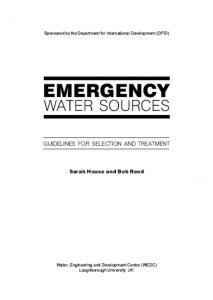
Emergency Sanitation (WEDC, 2002)
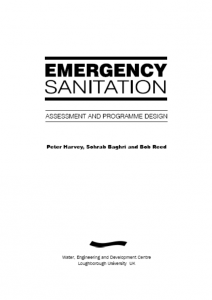
The book Emergency Sanitation: Assessment and programme design has been produced to assist those involved in planning and implementing emergency sanitation programmes. The main focus of the book is a systematic and structured approach to assessment and programme design. It provides a balance between the hardware (technical) and software (socio-cultural, institutional) aspects of sanitation programmes, and links short-term emergency response to long-term sustainability. The book is relevant to a wide range of emergency situations, including both natural and conflict-induced disasters, and open and closed settings. It is suitable for field technicians, engineers and hygiene promoters, as well as staff at agency headquarters.
- Tags: Excreta / Urine ReUse, Excreta Composting, Excreta Treatment, Household Toilets, WASH Monitoring, WASH Monitoring, WASH Programme Management, and WASH Programme Management. Organisations: WEDC and WEDC.
D405-2015a Emergency Desludgable (Raised with Holding Tanks) Latrine Design and BoQ (UNHCR, 2015)

This document contains documentation to help UNHCR and WASH actors build emergency raised desludgable latrines in refugee settings. The package includes: Technical Drawings; Step by Step Construction Drawings; Bills of Quantity; Material and Workmanship Specifications; and Design Calculations.
D-307/2015a Emergency Raised Water Platform (Concrete Rings) Design and BoQ (UNHCR, 2015)

This document contains materials to help UNHCR and WASH actors construct emergency raised water platforms in refugee settings. The package includes: Technical Drawings; Step by Step Construction Drawings; Bills of Quantity; Material and Workmanship Specifications; and Design Calculations.
D-306/2015a Emergency Raised Water Platform (Sandbags) Design and BoQ (UNHCR, 2015)
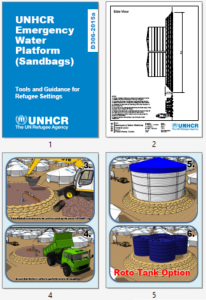
This document contains materials to help UNHCR and WASH actors construct emergency raised water platforms (sandbags) in refugee settings. The package includes: Technical Drawings; Step by Step Construction Drawings; Bills of Quantity; Material and Workmanship Specifications; and Design Calculations.
- Tags: Water Storage, Water Storage, and Water Storage.
D-300/2015a Emergency Tapstand (Wooden Pallets) Design and BoQ (UNHCR, 2015)
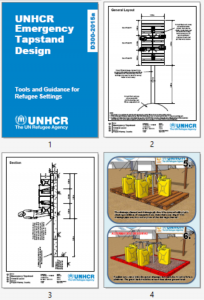
This document contains documentation to help UNHCR and WASH actors install emergency tapstands (wooden pallet) in refugee settings. The package includes: Technical Drawings and Step by Step Construction Drawings.
D-700/2015a Emergency Communal Shower Block (Wood and Plastic) Design and BoQ (UNHCR, 2015)

This document contains documentation to help UNHCR and WASH actors install emergency communal shower blocks (wood and plastic) in refugee settings. The package includes: Technical Drawings; Step by Step Construction Drawings; Bills of Quantity; Material and Workmanship Specifications; and Design Calculations.
- Tags: Bathing Facilities and Hygiene Promotion.
D-400/2015a Emergency Trench Latrine (Poles and Plastic with Raised Option) Design and BoQ (UNHCR, 2015)

This document contains documentation to help UNHCR and WASH actors install emergency trench latrines (poles and plastic) in refugee settings. The package includes: Technical Drawings; Step by Step Construction Drawings; Bills of Quantity; Material and Workmanship Specifications; and Design Calculations.
UNHCR WASH Rapid Assessment Forms (UNHCR, 2015)

These rapid (emergency) assessment tools can be used to help assess water supply, excreta management, solid waste management, hygiene and disease vector control conditions in the following refugee settings: These rapid (emergency) assessment tools can be used to help assess water supply, excreta management, solid waste management, hygiene and disease vector control conditions in the following refugee settings: Camps; Settlements; Transit Centres; Schools; Health Centres and Urban Settlements. It also contains references to UNHCR’s WASH indicators and recommendations for data collection.
- Tags: WASH Assessments, WASH Assessments, and WASH Assessments. Categories: WASH Emergency Tools.
UNHCR Sample ToRs for Hydrogeological Surveying (UNHCR, 2015)
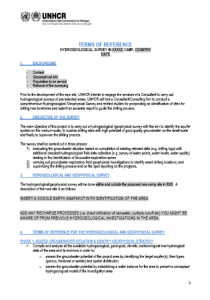
These sample terms of reference may be used should WASH actors working in refugee settings with to engage the services of a Consultant to carry out hydrogeological surveys of pre-selected areas. The terms of reference cover the following areas…
Evaluating the groundwater situation based on compilation of existing relevant data (e.g. drilling logs) with additional classical hydrogeological field data collection (e.g. survey of water points, water levels, water quality) leading to the identification of favourable exploration zones
Carrying out groundwater exploratory field geophysical investigations to identify exact drilling locations, and
Supervising the drilling process and on the spot reporting on the progress.
- Tags: Boreholes, Boreholes, Drilling, Drilling, Water Prospection and Investigation, and Water Prospection and Investigation. Languages: English, English, English, English, English, English, English, English, English, and English. Organisations: UNHCR, UNHCR, UNHCR, UNHCR, UNHCR, UNHCR, UNHCR, and UNHCR. DatabaseDocTypes: Hydrogeological Surveys. Categories: WASH Blank Forms, WASH Blank Forms, WASH Policy Guidelines, WASH Reference Documents, WASH Reference Documents, WASH Reference Documents, WASH Reference Documents, WASH Reference Documents, WASH Reference Documents, WASH Reference Documents, WASH Reference Documents, WASH Reference Documents, WASH Reference Documents, and WASH Terms of Reference.
 English
English
